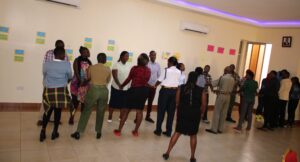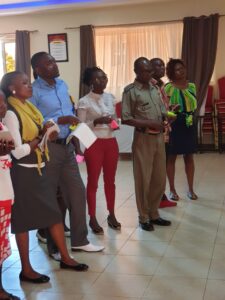Police Sensitization on Gender Based Violence Among Lesbian,Bisexual and Queer Women
Police officers are charged with serving and protecting the public—all of the public. While the Kenyan Police motto reads “Utumishi kwa Wote” Lesbian, Bisexual and Transgender (LBQT) people have often been given good reason to be wary of whether that responsibility and phrase includes them. Experiencing discrimination, harassment, violence, and abuse by police officers is bad enough and creates strong mistrust among LBQT pers ons and the police. With no recourse to justice and no mechanism for intervention and protection from bad policing LBQT persons are discouraged from reporting crimes, filing complaints, and seeking police assistance and protection when there is violence from family members and members of the community. They feel that there is no way to prevent perpetrators from victimizing them.
ons and the police. With no recourse to justice and no mechanism for intervention and protection from bad policing LBQT persons are discouraged from reporting crimes, filing complaints, and seeking police assistance and protection when there is violence from family members and members of the community. They feel that there is no way to prevent perpetrators from victimizing them.
When police officers lack information on LBQT issues and are not informed about how to implement police operational procedures involving them, they are not equipped to handle cases and needs of sexual minorities, 3W with much assistance from VGIF therefore saw the need to offer sensitization, training and enlightenment on issues of Gender Based Violence to the Kenya Police, Kisumu region.Most of the policemen called through seemed uniformed on matters LBQT and hence thorough sensitization was given to them in order for them to understand sexual minorities and their needs. We took them through what gender identity is- as it is a spectrum signifying personal sense of belonging and identification and not necessarily determined by genitals. We also discussed what sexual orientation is – as it refers to romantic and sexual attraction to others. Police officers must reflect the diversity of the community that they serve, regardless of one’s sexual orientation or gender identity.
 Are there laws protecting Sexual Minorities (LBQT) in Kenya? The facilitator Ms. Grace took us through Human Rights Based Approach (HRBA) on service Provision on GBV. Gender based violence (GBV) is violence targeted at individuals or groups on the basis of their gender on the other hand A \’Human Rights Based Approach\’ is about empowering people to know and claim their rights and increasing the ability and accountability of individuals and institutions who are responsible for respecting, protecting and fulfilling rights. The law enforcers hence need to know on HRBA in protecting the lives of LBQT persons, however this is not the case as criminalization of consensual same sex activities and anti-homosexuality laws are sometimes used as pretexts and vilification for general arrest of LBQT persons.
Are there laws protecting Sexual Minorities (LBQT) in Kenya? The facilitator Ms. Grace took us through Human Rights Based Approach (HRBA) on service Provision on GBV. Gender based violence (GBV) is violence targeted at individuals or groups on the basis of their gender on the other hand A \’Human Rights Based Approach\’ is about empowering people to know and claim their rights and increasing the ability and accountability of individuals and institutions who are responsible for respecting, protecting and fulfilling rights. The law enforcers hence need to know on HRBA in protecting the lives of LBQT persons, however this is not the case as criminalization of consensual same sex activities and anti-homosexuality laws are sometimes used as pretexts and vilification for general arrest of LBQT persons.
The principle of HRBA ensures protection, universality, equality and nondiscrimination of LBQT persons. Instances of domestic violence in same sex relationship always go unreported because there was a need to raise awareness that it happens and should be addressed. LBQT women face the highest risk of GBV yet get the least attention. It is always sadly viewed from a heteronormative point of view and the hence there’s a need to raise awareness and increase advocacy on GBV among Lesbian, Bisexual, Queer and Transgender persons. It is time to get recognition of, and desired action against, these problems from law enforcers who are supposed to aid survivors of GBV.
“Is there a docket in the police act where emotional abuse is captured?” – “There’s no arrest but only counselling. There’s a difference between spoken and written, as a spoken abuse is difficult to establish the case. If they can prove it to the court the better,” Pascal
On decriminalization, a session by Advocate of the high court Ms. Guya, we got to know that homosexuality is not a western concept as we’re always told and it is true to state that colonization came with draconian ru les and laws that categorized many practices including homosexuality in Africa horrendous and “barbaric” .
les and laws that categorized many practices including homosexuality in Africa horrendous and “barbaric” .
There are selected articles from the constitution of Kenya Bill of Rights that can be interpreted to ensure protection of LBQT women/men, Such include Article 27:Equality and Freedom from discrimination, Article 28:Human Dignity, Article 29:Freedom and security of the person, Article 31:Privacy, and Article 36:Freedom of association.Nobody wants to be a victim of crime but if the worst happens it’s important that victims feel confident enough to turn to the police for help. A police force that is sensitized to the needs of LBQT people and communities means better service and protection.It is important to note that all people, including lesbian, bisexual and transgender (LBQT)persons, are entitled to enjoy the protections provided for by international human rights law, including in respect of rights to life, security of person and privacy, the right to be free from torture, arbitrary arrest and detention, the right to be free from discrimination and the right to freedom of expression, association and peaceful assembly. 






